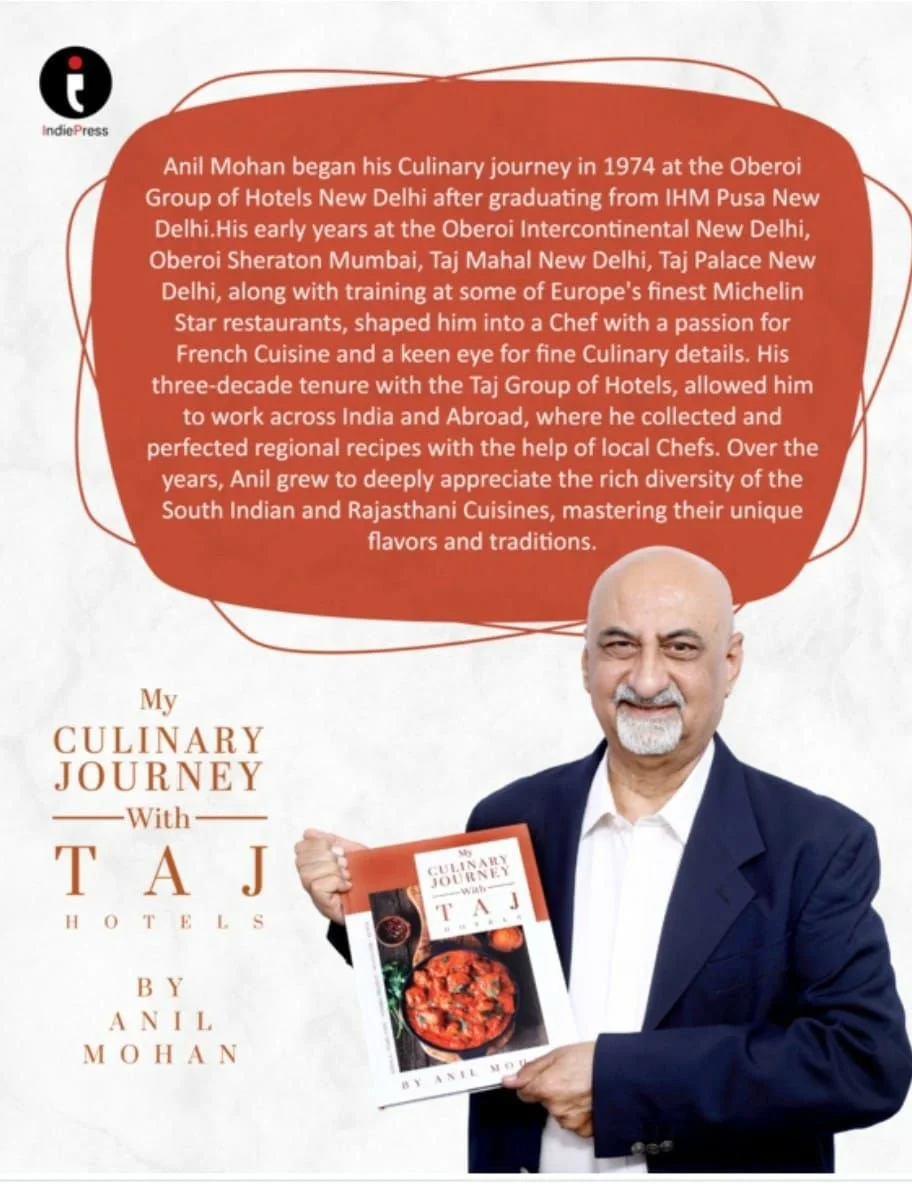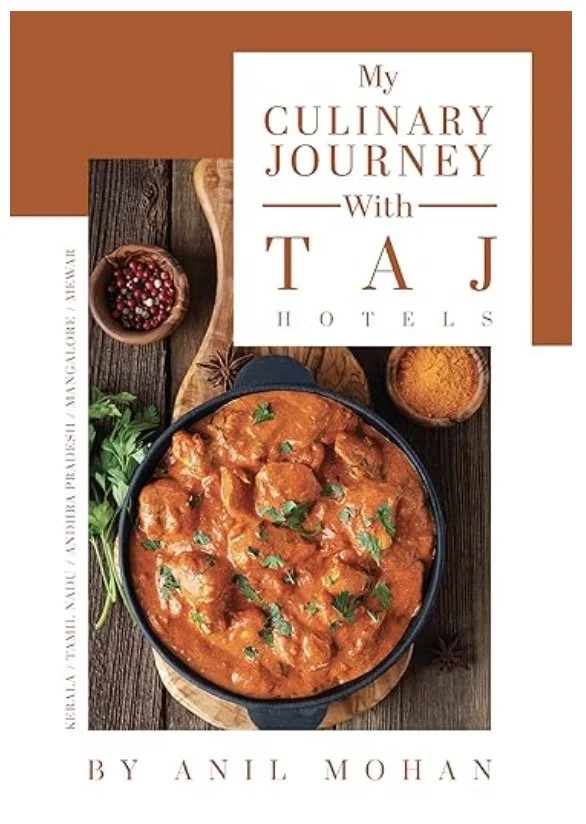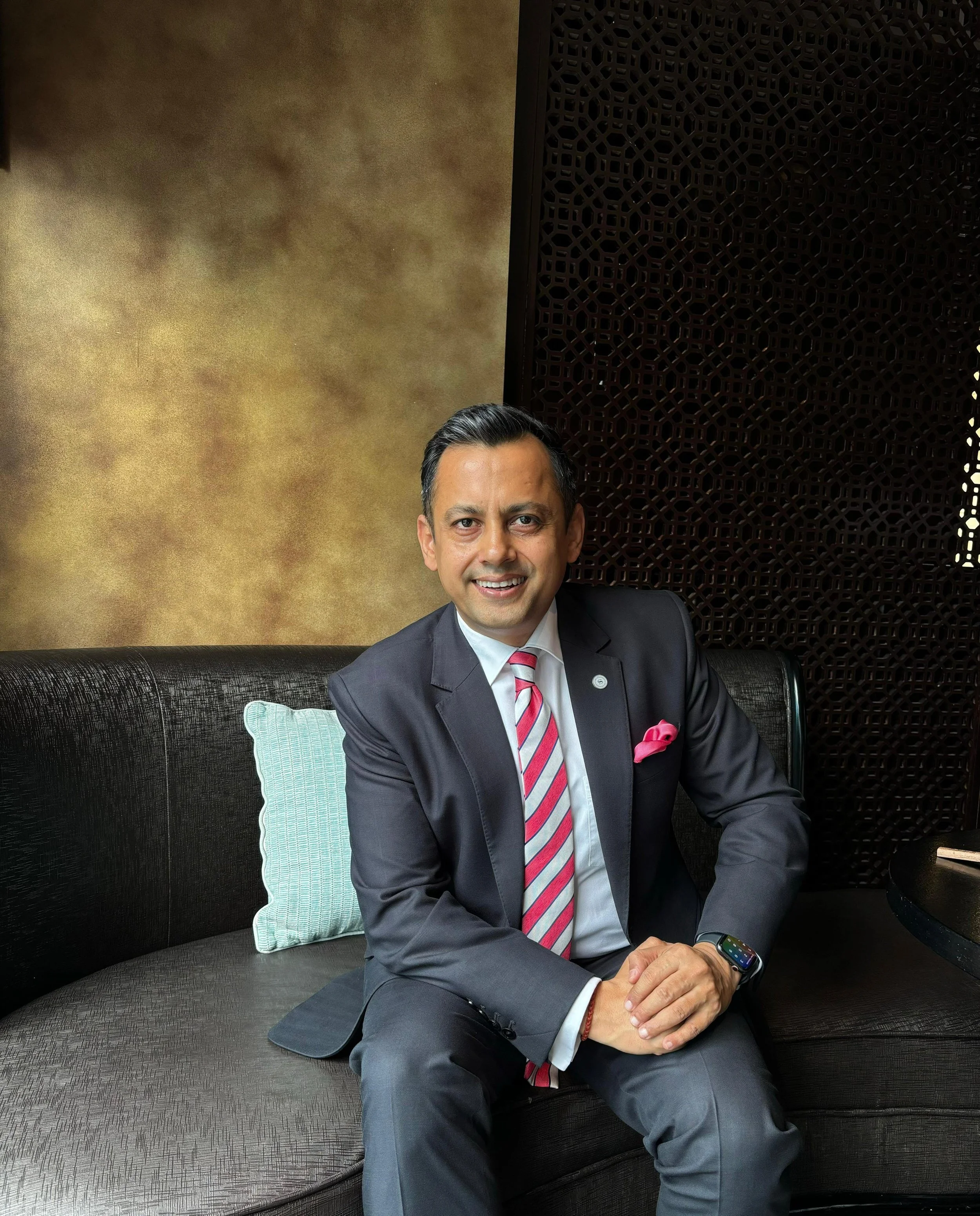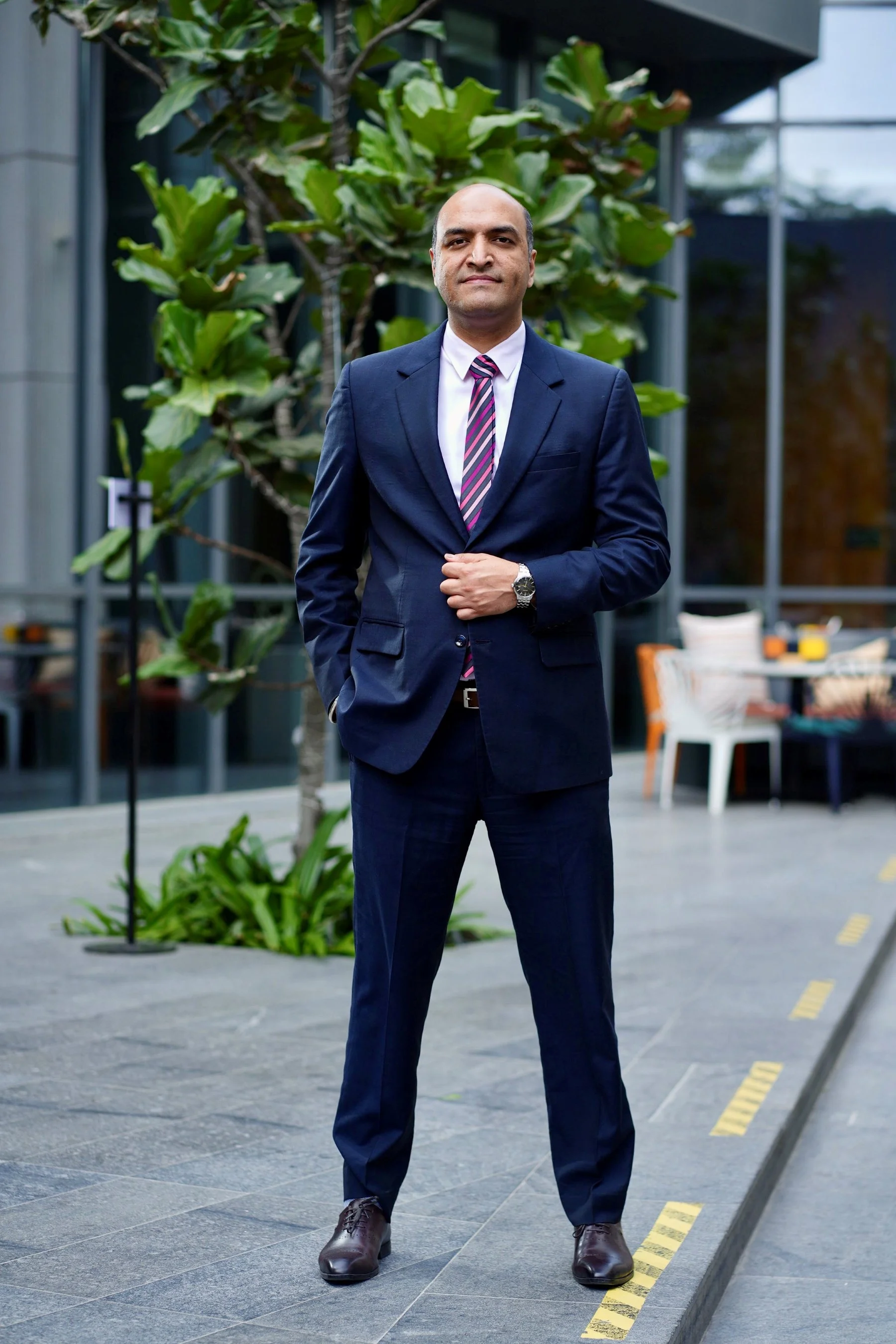Exclusive Interview | Chef Anil Mohan, Author, My Culinary Journey with Taj Hotels
/“A Chef is an artist with a sharp brain.”
Reflecting on your illustrious career, how did your early experiences with the Taj and Oberoi Groups shape your approach to culinary excellence?
I graduated from IHM Pusa, New Delhi in 1974. Those days, the Oberoi group was the premium chain of Hotels in terms of excellence and business results. India still lacked highly trained and qualified Chefs and therefore most of the senior Chefs were all Europeans. Working with those Chefs was a wonderful & highly enriching experience. I learnt the finer intricacies of Culinary skills during that period.
The Oberoi group is known for its uncompromising approach towards Hotel Operations including the Culinary expertise. Their strict sense of discipline, adherence to standard procedures and continuous process of improvement, resulted in inculcating these qualities in the mind of a young and budding Chef. Taj on the other hand had tremendous trust in the capabilities of its Chefs and by the time I joined them, I had already aquired the requisite expertise.
Taj valued its Chefs greatly and spared no effort to continuously train them in order to uplift their Culinary skills and also to keep them updated with the contemporary trends. Within the first few years of my joining them, I was sent for specialized training to the top Michelin Star Restaurants in London and Paris following which I successfully launched the Orient Express Restaurant at the Taj Palace Hotel, New Delhi. That was in 1983 and this Restaurant has been running successfully winning various awards and tremendous accolades till today.
What was the most challenging yet rewarding moment during your tenure as Executive Chef at Taj Residency, Bangalore?
The most challenging task for me at the Taj Residency Bangalore was when I was posted there as Executive Chef in 1985. Unfortunately, the hotel had lost its previous Executive Chef and for more than a year, there was no Executive Chef to manage the kitchen. The kitchen of a hotel is like its spine. And a headless spine can really create havoc. That's exactly what this kitchen was when I took over. There was zero discipline, there were various groups of cooks with each one trying to overide the others, food cost was running at 40%. In short, the kitchen was in utter chaos.
I came with the background of highly organised, successful, professional and disciplined kitchens of Taj Mahal Hotel and Taj Palace Hotel, New Delhi. It took me some time to take complete control of the situation, bring in systems & processes, infuse sense of discipline and convert the chaotic kitchen into one of the most well organised and highly successful ones. I had to take some very tough decisions which were ably supported by the then GM of the hotel. It was indeed the most rewarding time for me as, eventually, this kitchen was rated as one of the most well managed, most creative, highly profitable and having an excellent team of Chefs.
You’ve mentioned discovering the vast culinary heritage of South India. What’s one South Indian dish or tradition that left a lasting impression on you?
Coming to South from North India and having specialized in French cuisine, it was indeed a huge awakening to get acquainted with the South Indian food. I was mesmerised with so many new recipes that it is virtually impossible to pick one out. Yet it was this speciality from Kerala that I had never heard nor seen nor eaten before. It was Appam and Mutton Stew.
In 1984 when Taj Residency opened its doors to the guests, this dish featured in the first menu of Southern Comfort, the Coffee Shop. Those days, nobody in Bangalore was aware of this wonderful preparation. Taj had ventured into the interiors of Kerala to pick up a Cook who could make Appams and Mutton Stew and it was an instant hit. It became so popular that the Cook whose name was Jose, was lovingly rechristened as Appam Jose. This dish has not stopped fascinating me till today though the novelty of the 80's does not exist any longer as Appams are available across the city of Bangalore.
How did you manage to bridge the gap between French cuisine and regional Indian flavors in your culinary creations?
One of the prerequisites of a good Chef is to keep his mind open for the unlimited cuisines available accross the globe. During my stint at the Hotel Management School and later during my Chef training at the Oberois, I was exposed to all the Cuisines available, Indian, Chinese, French, Italian, Bakery/Confectionary, Gardemanger etc and finally specialized in the French Cuisine. So the Indian Cuisine was not an alien subject though it took me some time to dive deep into it.
As a General Manager, how did your experience as a chef influence your management style in the hospitality industry?
Being a General Manager with the background of an Executive Chef is of huge value which only a Chef can experience. As a successful Chef, one has to have a creative mind, a very acute eye for detail, cost consciousness, profitability, hygiene, leadership skills, man management etc. All these attributes are extremely powerful and imperative to be a successful General Manager. For me, therefore, migration from a Chef to a General Manager was like a cake walk.
The hospitality industry thrives on teamwork. What was the key to maintaining a harmonious balance between creativity and operational excellence with your teams?
Indeed, any organisation can succeed only if it follows the basic principal of Team Building and Teamwork. Hospitality Industry is no different. Fortunately for me, I was associated for about three decades, with the Taj which is a Tata company. The basic philosophy of every Tata company is employee centric. The Vision and Mission of Taj is Employee and Customer oriented. It is ingrained into the managerial style of every single Manager and Executive. There were various processes by which the GM would maintain harmonious relations with his Team while achieving the KRAs.
Your book appears to be a treasure trove of culinary and life experiences. What inspired you to pen down your journey?
I had the good fortune of working with excellent Chefs during my career. Right from Taj Residency Bangalore onwards, I compiled all the Recipes from all the Hotels that I worked at. The idea was to standardise all the recipes so that in the coming years, the Chefs would not have to reinvent the wheel. Post my retirement, when finally I hung my boots, the idea flashed in my head to compile a book comprising of some of the key recipes. In order to not to reduce it to a mere recipe book, I added some anecdotes too to make reading more pleasurable.
Could you share one recipe or story from the book that you believe truly defines your culinary philosophy?
I do not know if any recipe or story in my book reflects or defines my Culinary Philosophy. However there is one story that deeply touches my heart. "Life Lessons from Taj Pamodzi" is a real life story that reflects the true human behaviour. It also shows how judgmental we can be without looking at the flip side of the coin.
Having seen the evolution of the hospitality industry over decades, what’s one innovation or trend that excites you about the future?
The concept of Cloud Kitchen and quick delivery of good food is something that is very exciting. The present trend is highly focussed on presentation of food. But few things will and should not change. I fully endorse the modern trends of fancy presentations but not at the expense of quality of a dish. Also, in the name of creativity, one should not spoil the age old, tested & tried recipes.
What advice would you give to young chefs and hoteliers aspiring to leave their mark in the industry?
A Chef is an artist with a sharp brain. The top priorities should be on Culinary Skills, Passion for Cooking, Willingness to learn & do lots of Hard Work, Leadership Skills, awareness and complete hold on Financials, An Eye for Detail, Innovation, Hygiene and Team Building.







